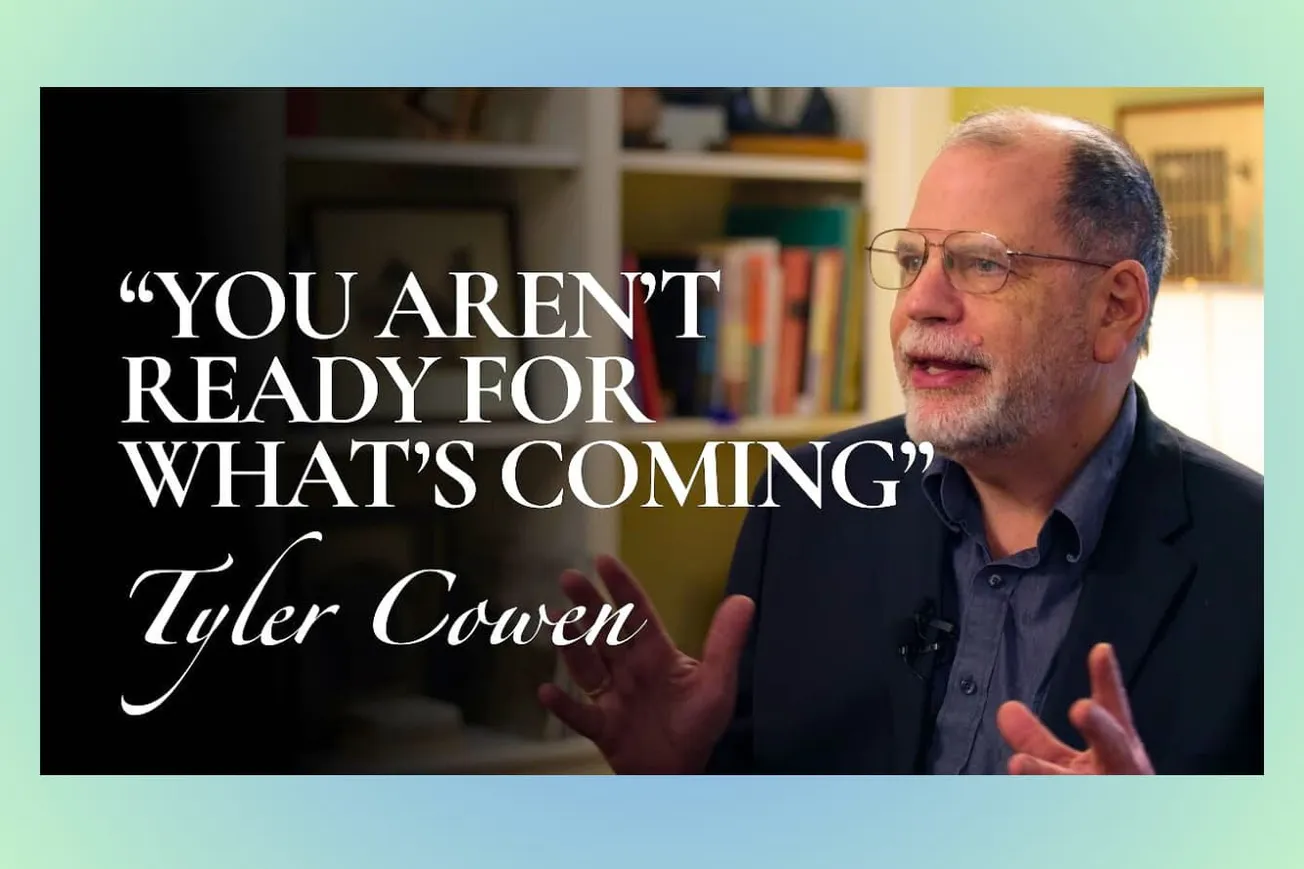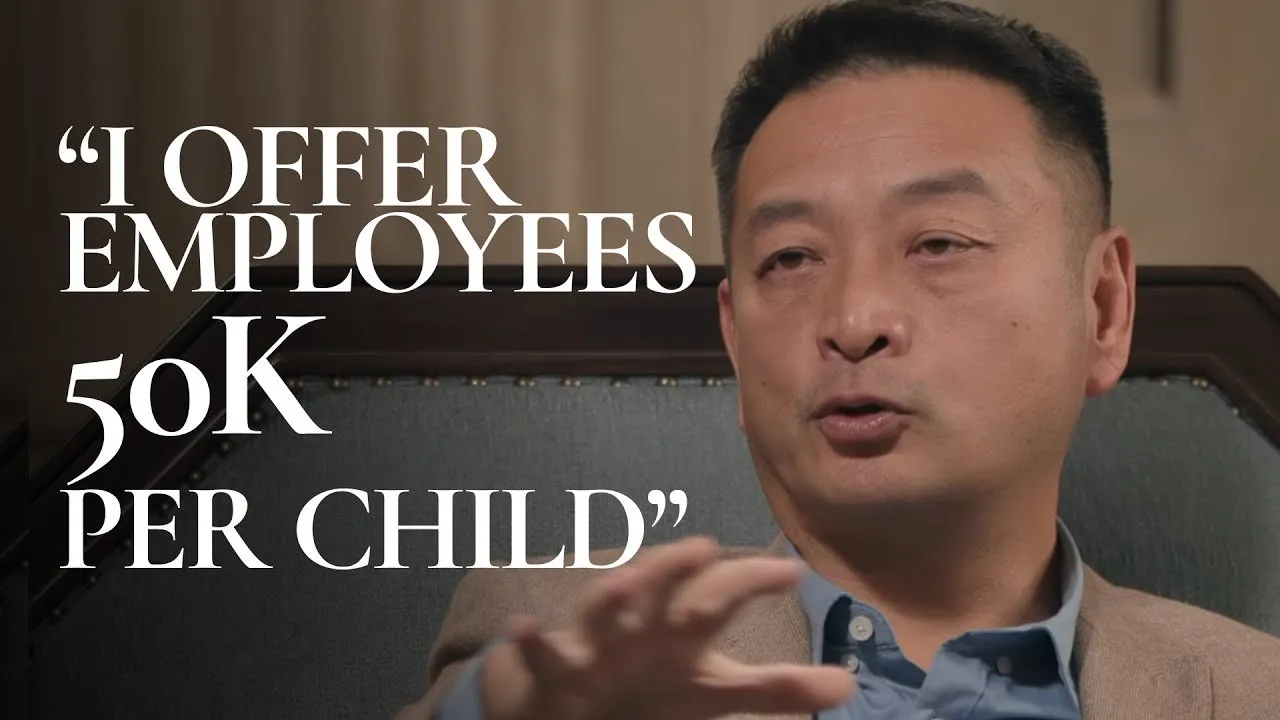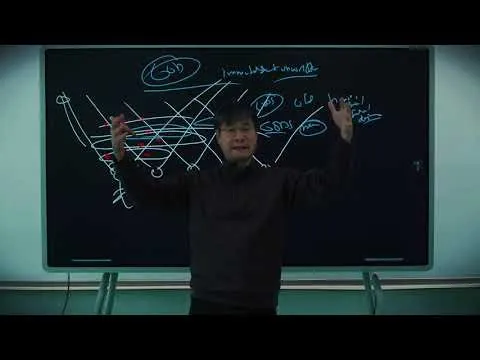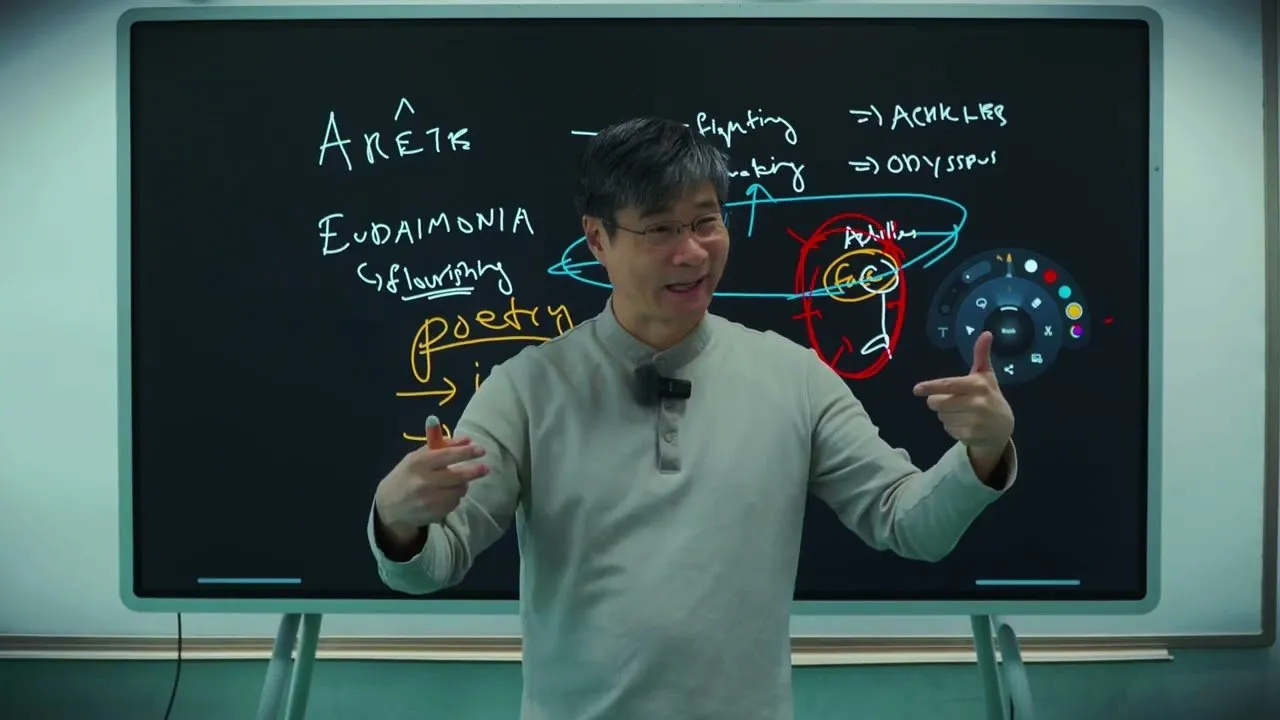Table of Contents
The emergence of DeepSeek, a Chinese AI model matching top US performance at a fraction of the cost, has highlighted a new era in cost-effective AI training and significantly shifted the landscape of US-China innovation. But beyond this immediate revelation, Tyler Cowen, the first to bring DeepSeek to public attention, offers a far more expansive and critical perspective. This discussion delves into his comprehensive view on how AI will fundamentally transform every facet of society: revolutionizing knowledge work, reshaping the very nature of warfare, redefining global economics, and impacting "everything in between." Cowen's insights reveal a future where AI radically splits the population, empowering a small portion of individuals to leapfrog the rest across all domains of work and life.
Key Takeaways
- DeepSeek, China's breakthrough AI model, suggests US chip sanctions may have backfired by accelerating Chinese innovation in efficient AI training methods—illustrating how restrictions often spark creative workarounds.
- Cowen argues openness typically outperforms restriction in technology competition, citing America's historical strength in open systems versus poor track records with closed development models.
- The "Great Stagnation" ended around 2020 with mRNA vaccines and AI breakthroughs, marking a return to "moving history" where parents can no longer predict their children's economic landscape.
- AI will likely create a bifurcated society with roughly 10-15% of people becoming extremely wealthy through AI mastery while others face stagnant wages but enjoy cheaper services and entertainment.
- For personal preparation, Cowen recommends investing time with the most advanced AI systems available, even if temporarily expensive, as essential education for understanding our evolving technology landscape.
- Content creators should prioritize open-source publication, originality, and personal authenticity, as AI-generated content makes generic writing increasingly worthless.
- Travel to places less saturated by modern technology becomes more valuable as AI advances, offering experiences AI cannot yet replicate effectively.
Timeline Overview
00:00 - 02:36 - Introduction: Overview of DeepSeek and the AI dynamics between the US and China
02:36 - 10:35 - US-China: DeepSeek: Analysis of US-China relations and DeepSeek's emergence
10:35 - 15:48 - Girard's Philosophy of Innovation: Discussion of René Girard's philosophy on imitation and innovation
15:48 - 33:20 - Moving History: End of the Great Stagnation: Exploration of the end of the Great Stagnation and moving history
33:20 - 37:11 - Wealth Distribution in the AI Age: Examination of wealth distribution in the AI age
37:11 - 49:58 - AI & Content Creation: Insights on AI's impact on content creation
49:58 - 01:00:03 - AI & Intellectual Work: Perspectives on AI's transformation of intellectual work
01:00:03 - 01:08:00 - The Value of Travel: Reflections on the increasing value of travel experiences
US-China AI Competition: The DeepSeek Surprise
DeepSeek—a Chinese AI model approaching the performance of top US systems at a fraction of the cost—has shocked the tech world. Tyler Cowen broke this news weeks before markets reacted, noting the irony that US chip sanctions may have inadvertently accelerated Chinese innovation. By restricting high-end chip access, America pushed China to pioneer efficient training techniques that require fewer computational resources.
"If I had been President Biden, I probably would have done the exact same thing," Cowen admits. "But sometimes you need to realize that what you tried didn't work... It's not clear whether I want China to be part of the same hardware network as I am or for China to fully develop its own independent hardware network and other innovations."
This scenario parallels how America unintentionally jumpstarted China's space program through the deportation of Qian Xuesen, a Chinese-born Caltech professor who later founded China's space program after being accused of communist sympathies during the Red Scare.
When considering how economic innovators should defend against laggards, Cowen stands firmly on the side of openness: "We're not very good at choosing the right restrictions and enforcing them. There's always more direct forms of espionage... so you might as well get the advantages of openness."
- America culturally excels at openness rather than restriction
- AI technology inherently resists tight control compared to nuclear secrets
- DeepSeek's success through distillation shows how innovation finds alternative paths
For policymakers confronting these challenges, Cowen offers straightforward advice: "The best thing you can do is familiarize yourself with AI. My sense is remarkably few people in government are at the AI knowledge frontier."
He emphasizes this point for everyone: "It is worth spending some extra money to have access to the best systems. If you don't have that access, it's actually quite a bit harder to understand what is going on."
Girard's Philosophy of Innovation
"Not so long ago in Europe, the Americans were portrayed as primarily imitators … then, in very few years, the Americans became great innovators. Public opinion is always surprised when it sees the modest imitators of one generation turn into the daring innovators of the next … Until quite recently, the Japanese were dismissed as mere copiers of Western ways, incapable of real invention in any field. They are now the driving force behind innovation in more and more technical fields … At this very moment, imitators of the Japanese—Koreans, Taiwanese—are repeating the same process. They, too, are fast turning into innovators. Hadn't something similar already occurred in the 19th century, when Germany first rivaled and then surpassed England in industrial might?"
(René Girard, “Innovation and Repetition”)
Discussing René Girard's philosophy of innovation, Cowen challenges the notion that imitation and innovation are opposites. Looking at economic history, seemingly lowly imitators often transform into powerful innovators—Japan, Korea, Taiwan, and Germany all followed this pattern as they first copied then surpassed established powers.
"The Beatles were imitating rhythm and blues, Chuck Berry, the Everly Brothers, Elvis Presley—The Beatles were the first to admit it. But at the same time, it was quite fresh and bold. To think that copying and innovation are opposites is maybe the mistake here. Be more Hegelian about it."
Cowen isn't particularly troubled by China's technology acquisition methods: "I'm not very upset by what China has been doing. If something is illegal or unethical, then yes, nominally I would be against it, but in terms of my level of concern, it's mostly inevitable."
He adds: "It does help China catch up in terms of living standards. I think it's in the best interests of the world and the US to have a richer China than a poorer China... We've lived under a poorer China, say in the 1960s. That was no fun, and it certainly was awful for the Chinese."
This perspective sees technological development as dialectical rather than linear—innovation and imitation feeding each other rather than representing separate processes.
Moving History: The End of the Great Stagnation
In 2011, Cowen published "The Great Stagnation," predicting continued economic sluggishness. What changed?
"I think the great stagnation ended in 2020," he declares. "If I had to pick a date, it started around 1973... In 2020, we have mRNA vaccines." He notes the COVID vaccine "was designed in a day" despite experts predicting a four-year timeline—and was ready in under a year.
This breakthrough, alongside AI developments, marks a profound shift. "The general purpose technology that broke the great stagnation was a combination of the internet and what I would call computation."
For ordinary people, this creates a disorientating reality. "It's very disturbing that you can no longer tell people what kind of world they should prepare their kids or grandkids for," Cowen observes. Unlike previous generations where career paths remained relatively stable, today's parents face fundamental uncertainty about their children's economic landscape.
"I was born in 1962, so I'm now 63 years old. Really, at no point in my life did I need to relearn how to operate any device. I learned how to drive when I was 16. I didn't have to relearn anything. Nothing. That's stunning."
Cowen identifies various psychological "copes" people adopt facing AI advances:
- Dismissing AI as merely a fun phone app that hallucinates too much
- Fatalistic doom prophecies about unstoppable catastrophe
- Modest predictions that require minimal personal adaptation
Wealth Distribution in the AI Age
Cowen's book "Average is Over" predicted a world where 10-15% of citizens become extremely wealthy through AI mastery while others face stagnant wages but enjoy cheaper services and entertainment. This economic bifurcation raises questions about democracy's future when wealth becomes highly concentrated.
"People will have happier lives overall. That's no guarantee of democracy going well, but I don't predict some kind of slide into chaos or totalitarianism. It'll just be a very different world. We'll have to do a lot of coping, adjusting of expectations."
He notes that Donald Trump was "not the candidate that all the rich people were putting up" yet was elected twice, suggesting wealth concentration doesn't automatically determine political outcomes.
The fundamental challenge remains adaptation rather than prevention: "It's going to be a lot of big challenges. I just get to them and mean, let's do the best. We're going to have these challenges anyway."
AI & Content Creation: Writing for Machines and Humans
As AI systems increasingly mediate information consumption, content creators must adapt. "More and more people query AIs... the less they're directly reading humans. So you want your ideas to be input for the AIs."
This creates new priorities for writers:
- Produce open-source content AIs can access
- Emphasize originality over repetition
- Consider AI models as your "deepest and most sympathetic reader" with perfect memory
Cowen believes that writing well for humans and writing effectively for AI systems largely converge: "Properly understood, the two enterprises are pretty much the same, but I'm trying to get people to properly understand it."
However, AI heightens the premium on authenticity and personality. "AI writing is not on par with the best human writing yet, but the fact they can kind of write like humans cheapens bland writing as a whole. You need to inject excess personality."
This explains the resurgence of podcasts, videos, and in-person appearances: "If it wasn't for AI competing against my writing, the number of videos and podcasts I would do, I would cut by a factor of three or four and do more writing. But no, we're doing this. This is better and more important and will have more impact, and the AIs cannot copy it."
AI & Intellectual Work: The Shifting Landscape
In February 2025, Cowen admitted that advanced AI already outperforms him in economics: "In a test of 100 questions, [O1 Pro] would beat me. I don't really have much doubt."
While he maintains advantages in judgment, research preparation, and identifying important questions, he sees the writing on the wall. "The improvements will be coming... and just answering the economics questions, it beats me."
This transforms academic training fundamentally: "More people should study how to operate AI and spend less time learning about the subject—though you need to know a fair amount about the subject to know how to operate AI."
The human role becomes more like a "dog trainer"—directing AI toward useful problems, providing context, and coordinating between different systems. "At some point, the human double-checker of the AI won't make that much sense."
Traditional academic career paths face disruption: "It won't be like the old system where if you got a PhD in economics from a good school, you were almost right off the bat employable at a top 30-50 tier-one research university. That will be on the way out."
Yet institutions may change slowly: "A lot have big endowments, many more have what I would call sticky tuition revenue. People are just going to go to school for the fun, for the credential, whether or not they learn. That gives them a financial base where maybe they don't have to adjust for very long."
The Value of Travel in an AI World
As AI revolutionizes information access, travel to culturally distinct places gains special value. "AI raises the value of travel to other places, to very different places," Cowen argues. "YouTube to some extent can make a trip to Madagascar come alive for you. I don't think AI does that very well, not yet and not in the next few years."
He advises: "Substitute more into things that the AI cannot do, because during the regular day, you'll be doing more AI."
Places less saturated by technology become increasingly precious—whether small religious communities or second-tier cities in developing nations. "Get out of the main capital... go to the number two or number three cities when you're extremely safe. It's some version of something from 1950 in a way, but with people having mobile devices."
Cowen's biggest regrets include missed travel opportunities: "I regret never having seen Syria before it was literally physically destroyed. I regret not having gone to Russia more... Some of my biggest regrets in life are things that are gone, will not come back."
This curiosity about the world—including AI's transformations—keeps Cowen optimistic. "Humanity will understand much, much more about the world. I think that's intrinsically valuable in addition to its instrumental uses."
Unlike colleagues who dread technological change, Cowen is "making a deliberate attempt to stay in as good health as I can, and exercise more. I want to see as much of it as possible... I'm consciously working much harder toward optimizing my lifespan."
What's Next?
As AI reshapes our economic landscape, staying ahead means embracing rather than avoiding these technologies. Invest time exploring advanced AI systems, seek authenticity in your work, and experience culturally distinct places while they remain. The world is entering a period of "moving history"—prepare accordingly.
As Tyler Cowen reminds us, periods of stability ultimately require embracing change. There is no universal basic income for humanity as a whole—our collective future depends on our willingness to adapt.









